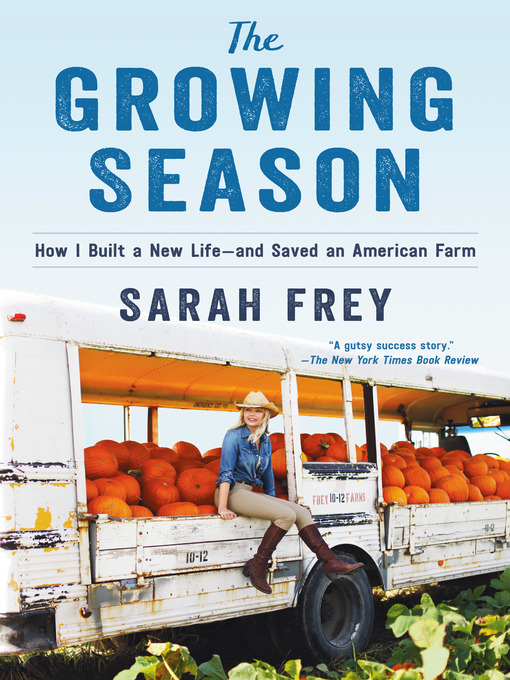
The Growing Season
How I Built a New Life—and Saved an American Farm
کتاب های مرتبط
- اطلاعات
- نقد و بررسی
- دیدگاه کاربران
نقد و بررسی

March 23, 2020
In this passionate, though humble, memoir, Frey, CEO of Frey Farms, writes of growing up in poverty and becoming a successful businessperson. Frey traces her scrappy upbringing on a ramshackle Southern Illinois farm in the 1970s, where the house didn’t have indoor plumbing and was heated only by a wood stove. There, she worked with her older brothers and father who insisted she do the same work as her brothers (in one particularly intense passage, her father insists that seven-year-old Sarah throw an enormous snapping turtle in the back of his pickup). After working summers with her mother selling melons to local grocery stores, a 15-year-old Sarah began spending more time on the road hauling produce than she spent in the classroom. At 18, she took out a loan and bought her family’s failing farm, which her father had nearly lost in foreclosure; by her early 20s, she was supplying tractor trailers full of produce to Walmart. As Frey explains, through sheer grit and business acumen—she was selective in what produce she sold, negotiated better prices with retailers, and aggressively marketed her goods—she had turned the mismanaged farm into a multimillion-dollar business with hundreds of employees. Frey’s energetic, inspiring memoir will appeal to small business owners and anyone who likes a bootstrapping success story.

April 1, 2020
The story of a hardscrabble childhood that, through dint of hard work, blossomed into a multimillion-dollar fruit business. Frey details her life growing up poor on a southeastern Illinois farm, where they had no indoor plumbing and burned wood for heat in winter and where they grew or shot their food. The author and her brothers learned to be tough at a young age, but she doesn't relate her circumstances in anything less than a matter-of-fact, frequently enthusiastic voice, making the narrative move along in a highly engrossing manner. Though life was demanding, the family was tight. Frey's father might have taught her independence, but he had no head for business and got by on his wits. Her mother would do what she could to help--e.g., running a melon route where she would pick up local watermelons and cantaloupes and sell them to regional markets. It was backbreaking work, but it put cash in their hands to pay the mortgage. "I loved meeting people, making deals, and I also knew that this was something that could be scaled up exponentially," writes Frey, who, at 14, learned the fundamental elements of commerce. At 15, she had her own melon route; at 17, she bought the family farm when the bank came to foreclose. "Without this land, I thought, where will we be? More importantly, who will we be?....If I walked away," she writes, "my brothers and I would never have anything to come home to." Throughout, Frey makes clear her belief that family sticks together. "Blood is blood," she writes. "Alone in the world we would be broken. Together we could withstand anything. Right?" And they did, with endless determination and a lot of learning on the fly. With earnest, effective storytelling, Frey demonstrates her character: "impatient, driven, restless, and at time obsessive"--and highly successful. A heart-gladdening memoir of a rare triumph over poverty.
COPYRIGHT(2020) Kirkus Reviews, ALL RIGHTS RESERVED.

May 15, 2020
The first part of Frey's memoir describes a young life in the vein of Tara Westover's Educated (2018) or Jeannette Walls' The Glass Castle (2005). Born into a large, hardscrabble family with a charismatic but ne'er-do-well father, Frey recalls a happy early childhood. As she grows, she sees that other families live vastly different lives, and realizes her family's poverty hinges on her father's seldom-fulfilled schemes. One by one, her bullied, overworked older brothers leave the farm. Frey accompanies her business-savvy mother to buy and sell melons, and this proves to be Frey's way out of both poverty and southern Illinois, which she has longed to leave. A moment of reckoning, however, reveals her deep love of the land, her commitment to agriculture, and her drive to succeed. She ends up staying. The book's second half details Frey building a fruit and vegetable empire and beckoning all her brothers to join the business; she's now known as "America's pumpkin queen." Frey's story of grit and grace is the best kind of American success.Women in Focus: The 19th in 2020(Reprinted with permission of Booklist, copyright 2020, American Library Association.)

Starred review from June 1, 2020
Farmer, entrepreneur, and now author Frey traces her life from a largely unsupervised childhood roaming her parents' farmland in southern Illinois to her current position as head of a billion-dollar company: family-owned Frey Farms, one of the largest produce companies in the United States. Similar to Tara Westover's Educated, this part memoir, part entrepreneurial story, tells of one woman's success in business based on relationships of mutual trust with other farmers, accompanied by her sheer hard work. Frey shows how successful personal interactions have helped along the way, as she brings fruit and vegetables, including the company's signature pumpkins, to various states. The author also adds some of her thoughts on what it's like to be a modern farmer, which are sometimes hilarious and often endearing. She has the inimitable quality of appearing not as someone who accomplished so much at such a young age but rather a person readers will enjoy getting to know, chapter by chapter. VERDICT Frey brings a breath of fresh air to both the personal memoir genre and the business world. Her writing is crisp and her personality winning. A must-read.--Stacy Shaw, Denver
Copyright 2020 Library Journal, LLC Used with permission.

























دیدگاه کاربران